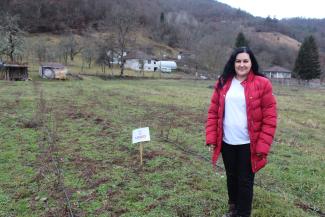March 2018—The people of Rudo, a small town in eastern Bosnia and Herzegovina (BiH), live off the land, growing fruits and vegetables or raising cattle. There are no factories and companies, so citizens are mostly left to fend for themselves against the forces of nature. Sanja Mršević is one of the thousands who share this fate.
In 2017, as the mother of two children, Mršević was in the difficult position of needing to support her family, while also being the primary caretaker for her sons. One of her sons, Slavko, is a teenager with autism, who was expelled from high school because of his disability. His expulsion left him isolated and devastated — going to school was his biggest source of happiness and the only way to be included in Rudo society.
While taking care of Slavko and fighting the town’s educational system, Mršević also needed to earn a living. She tried her hand at growing raspberries to sell, clearing and cultivating a small raspberry patch. But due to unfavorable market and weather conditions, it was not enough to live on.
Mršević applied for and received support from USAID’s small-grants fund for businesses owned by marginalized women — the Marginalized Populations Support Program. As part of the program, Rudo municipality also provided support. Mršević used the grant to plant another raspberry field, and is now hoping to produce 7 or 8 tons of the fruit in 2018. If weather permits and the purchase price is good, Mršević will have enough money to buy a tilling machine, making the work easier, cost-effective, productive and, ultimately, profitable.
The funding and other support not only results a better life for Mršević, but also for several young people she hires during harvest, providing them with an income in a town where such opportunities are rare.
Slavko, still at home, helps tie the plants and pick berries, and working on the farm is like therapy to him, his mother says.
“The hope this raspberry farm gave us is one of the rare bright spots we see in this struggle. It means a lot to me and my family and, most of all, to Slavko. If we win our fight to get him back in school, we will be one happy family,” Mršević says.
Mršević is one of almost 100 women in BiH who have received support from USAID’s Marginalized Populations Support Program and nine municipalities to launch and grow their own businesses, providing them with livelihoods and independence, and restoring their faith in a better future. The program, which runs from 2015 to 2020, is designed to help groups underrepresented in BiH society, such as women, youth, people with disabilities, Roma and the LGBTI community.
LINKS
,“The hope this raspberry farm gave us is one of the rare bright spots we see in this struggle.”

USAID Marginalized Populations Support Program
